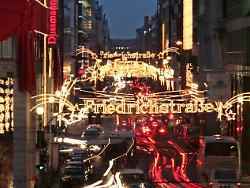Lights out at Christmas?
“Celebrating in the dark must not be the answer”
9/3/2022 10:03 am
The gas crisis is forcing Germany to save as much energy as possible. There is enough savings potential – buildings and billboards are already dark. But criticism from business is growing. And some are already worried about the all-important Christmas business.
The federal government wants to save energy because of the dependency on Russian gas with new requirements. “Every kilowatt hour saved helps a little bit out of the dependency on Russian gas supplies,” it says. As a result, the lights are already out in many places. In Berlin, the outdoor lighting of many prominent buildings had recently been switched off. And neon signs should also be switched off between 10 p.m. and 4 p.m. – unless the light is needed to avert danger or for traffic safety.
The German advertising industry therefore already sees itself in existential difficulties. The measures decided upon essentially threatened the branch of the so-called “Out of Home” media, explained Kai-Marcus Thäsler, Managing Director of the Association for Outdoor Advertising (FAW). This includes any outdoor advertising – such as posters or illuminated billboards – in public spaces. The industry is basically ready to make its contribution, but there is a sticking point: the light has to be switched off for too long.
Outdoor advertising is particularly effective in the morning between 6 a.m. and 9 a.m. The FAW had therefore advocated switching off the lights only between 10 p.m. and 6 a.m. Backing comes from business psychologist Florian Becker: “Neon signs that don’t light up at night don’t attract attention,” says the expert. This could become a problem, especially for those companies that rely on walk-in customers. It must be considered where it makes sense to turn off the light. At night, without a neon sign, you wouldn’t even notice that there was a gas station at night.
“This is purely symbolic politics”
With a view to Christmas, fears are growing that the cost-cutting measures could also affect other sectors. According to the Berlin CDU state chairman Kai Wegner, doing without the Christmas lights, for example, would have negative consequences for retail and the catering and hotel industry. Wegner pointed out that nobody wanted to come to a dark metropolis over the holidays and the turn of the year. “Light also means hope. And Christmas is the celebration of hope.”
According to the politician, Germany and Berlin are now in their third year of crisis. The situation is difficult for many. “Many people were very lonely during the corona pandemic, especially because of the numerous requirements and rules. It was particularly difficult for many at Christmas,” he said. Added to this was a war in the middle of Europe – with the result of exploding energy and food prices. “Now switching off the lights at Christmas to celebrate in the dark shouldn’t be the answer.”
Wegner expressed general doubts about the usefulness of switching off the outside lighting. “This is purely symbolic politics that is actually of no use to anyone,” said the Berlin MP. The actual savings effect has not been proven. And pedestrian zones, parks and sidewalks in particular need to be bright places, Wegner said. The more dark rooms there are, the more fearful spaces there are.
